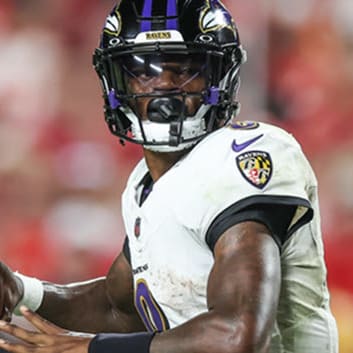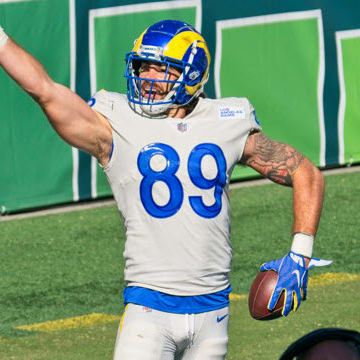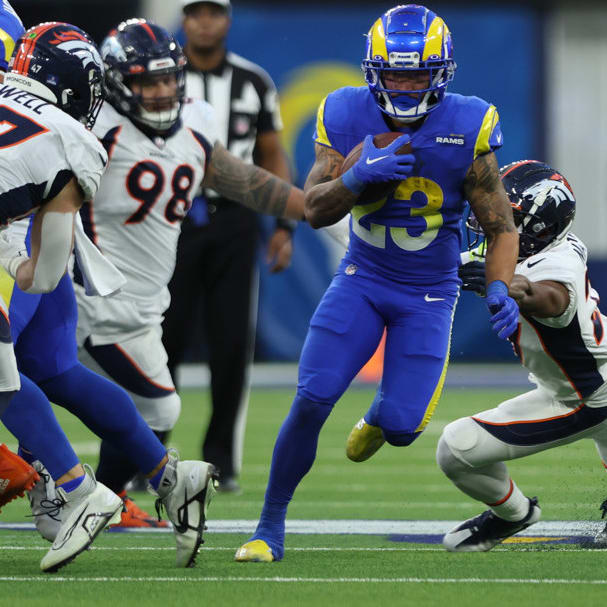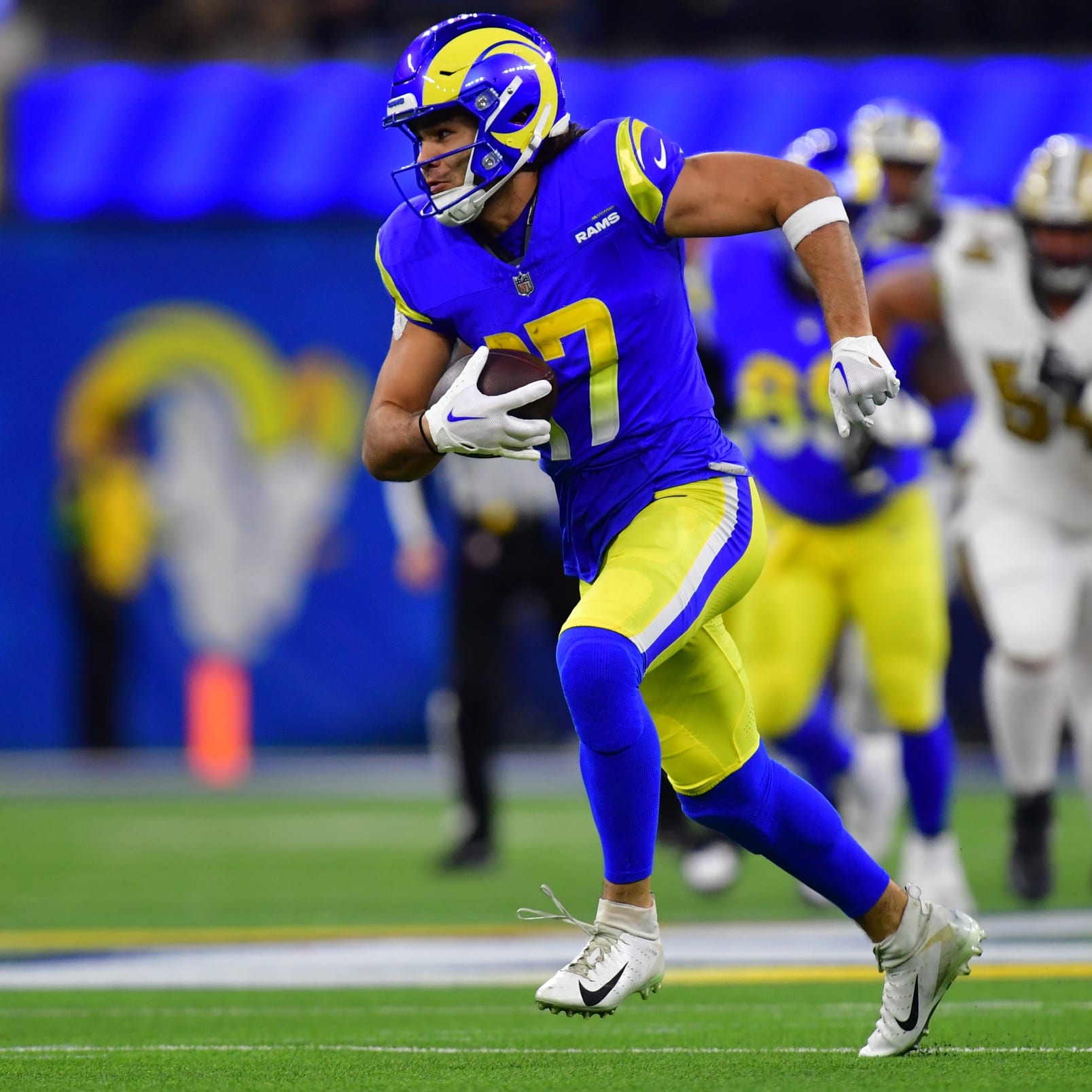This article is part of our Job Battles series.
Here is something quick on the Jacksonville running backs. The ADP data cited is from August 25 onward.
Jacksonville Running Backs
Ryquell Armstead (192.73 NFFC, 189.0 BB10)
Chris Thompson (183.91 NFFC, 192.77 BB10)
Devine Ozigbo (288.79 NFFC, 240.42 BB10)
James Robinson (396.0 NFFC, N/A BB10)
Folks are scrambling to learn everything they can about these four runners in light of the Jaguars cutting Leonard Fournette on Monday. Look no further.
Ryquell Armstead is your favorite to start after serving as Fournette's primary backup in 2019, Armstead's rookie season. The Jaguars selected Armstead in the fifth round out of Temple, where he was a three-year standout. Armstead is a high-motor runner who invited and broke through a lot of contact with the Owls, which made his brand mostly that of a power back going into the combine. Then he ran a 4.45-second 40 at 5-11, 220 pounds, proving he could project for big plays in the NFL. Because of his violent running style and explosive athleticism at a bigger build, I compared Armstead to Chris Ivory, which was meant as a compliment. The downside of the comparison is the implied durability risk and limited pass-catching upside. Armstead's pass-catching production was awful at Temple, and that carried into his rookie year as he caught just 14 of 24 targets for 144 yards (58.3 percent catch rate, 6.0 YPT). Armstead's poor rushing returns as a rookie (108 yards on 35 attempts, 3.1 YPC) would be an understandable source of additional concern, but his work at Temple tells us he can do much better there. That same Temple production implies he probably can't do better as a pass catcher, on the other hand.
Chris Thompson will be the unchallenged running back in passing situations. A skilled player familiar with offensive coordinator Jay Gruden, Thompson gives the Jaguars the option of limiting Armstead to the pure-running tasks that suit him better. The problem with Thompson is that he's turning 30 in October, and for his entire career going back to Florida State he's endured one of the league's most disturbing injury histories. There just isn't reason to expect Thompson to stay healthy, even if his workload is minimized. That leads to an important point: Fournette's release doesn't change anything for Thompson, so it doesn't make sense to raise him in your rankings. He was the pass-catching specialist before, and he still is now. Thompson is the kind of PPR pick who's great when he's free, but if his acquisition prices rises he's liable to turn into a trap pick. The upside here is categorically limited because he won't get more than a pass-catching specialist role, and the downside might be understated when you combine his injury history with the fact that he won't get more than a handful of change-of-pace carries otherwise. At his best, though, Thompson should provide FLEX utility in PPR formats.
Devine Ozigbo should be thought of as a similar but lesser prospect to Armstead – a well-built back (5-11, 222) who runs with a hot motor between the tackles. Armstead is fast, though, and Ozigbo is slow. Ozigbo ran a 4.65-second 40 on the Nebraska pro day track, which might have been more like a 4.7 at the combine, though to be fair Ozigbo did post strong jump numbers (37-inch vertical, 124-inch broad jump). Ozigbo has some juice to work with and runs with intensity, but his lack of elusiveness stands out on tape. Players with his prospect profile generally don't win prominent roles – it typically requires an injury ahead of them on the depth chart, with a running back committee the most likely outcome otherwise.
The wildcard of the group is James Robinson, an undrafted rookie out of Illinois State. Those two details bode poorly for his projection, but Robinson was at least a combine invite and he did well for himself there. His 4.64-second 40 wasn't good, but it was forgivable on a dense 5-9, 219-pound frame. The 40 time goes from forgivable to forgettable in light of Robinson's 40-inch vertical, 125-inch broad jump, and 11.22 agility score. For the rest of the Robinson background I'm going to quote the blurb I wrote on April 3, when I included Robinson in my All-Overlooked rookie article.
Robinson is a densely-built running back, yet he showed some of the most explosive athletic testing among the 2020 combine running backs. His 40 time (4.64, 24th percentile) was below average, but it's offset somewhat by his plus density, and it's all but erased otherwise by his 40-inch vertical (93rd percentile), 125-inch broad jump (88th percentile), and 11.22 agility score. This guy is well-built but springy, and his production at Illinois State was encouraging, too.
Robinson took on an enormous burden in the Illinois State offense, running for 1,917 yards (5.3 YPC) and 18 touchdowns in 15 games while the Redbirds passing game produced just 1,767 yards and 10 touchdowns. That's insane! Not only that, but the second-leading runner for Illinois State was clearly nowhere near Robinson's level, providing measly volume (476 yards) on a weak 4.3 yards per carry. Robinson took on an incredible burden in 2019 yet still left his teammates far behind in terms of per-play explosiveness. That's impressive!
Like Armstead and Ozigbo, Robinson categorically cannot challenge Thompson for the passing down considerations. His college production and combine testing imply that he might, however, be a capable pure runner in the NFL. It's certainly better than Ozigbo's profile, and arguably as good as Armstead's.
The way the backfield should work is this: Armstead is the starter and lead runner to begin with. If he gets hurt or fails, then Ozigbo would likely get an audition in the pure-running role, still likely in a committee with Armstead. Thompson will have his pass-catching work and change-of-pace carries in either case, with minimal prospects of workload escalation regardless of what happens around him. Armstead and Thompson both have durability issues in their histories, though, and if they end up on the shelf then it's down to Ozigbo vs. Robinson. Robinson's history says he's a major threat in that scenario, though the Jaguars might be forced to add a veteran free agent if things get that bad.
Conclusion
Armstead is in any case the first back to own here, followed closely by Thompson in PPR scoring. The question of whether they're worth their new prices is a very different question, and it's possible that inflation will make either or both runners poor values in drafts despite their increased opportunity. If Armstead and Thompson get too expensive, then you might be better off trying to get Ozigbo or Robinson for free.












